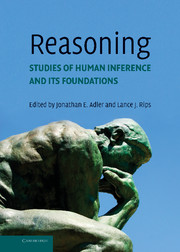Book contents
- Frontmatter
- Contents
- Preface
- List of Contributors
- Introduction: Philosophical Foundations
- PART I FOUNDATIONS OF REASONING
- PART II MODES OF REASONING
- Section 3 Deductive Reasoning
- Section 4 Induction
- 14 Patterns, Rules, and Inferences
- 15 Inductive Logic and Inductive Reasoning
- 16 Reasoning in Conceptual Spaces
- 17 Category-Based Induction
- 18 When Explanations Compete: The Role of Explanatory Coherence on Judgments of Likelihood
- 19 Properties of Inductive Reasoning
- Section 5 Dual and Integrative Approaches
- Section 6 Abduction and Belief Change
- Section 7 Causal and Counterfactual Reasoning
- Section 8 Argumentation
- PART II INTERACTIONS OF REASONING IN HUMAN THOUGHT
- Index
- References
15 - Inductive Logic and Inductive Reasoning
Published online by Cambridge University Press: 05 June 2012
- Frontmatter
- Contents
- Preface
- List of Contributors
- Introduction: Philosophical Foundations
- PART I FOUNDATIONS OF REASONING
- PART II MODES OF REASONING
- Section 3 Deductive Reasoning
- Section 4 Induction
- 14 Patterns, Rules, and Inferences
- 15 Inductive Logic and Inductive Reasoning
- 16 Reasoning in Conceptual Spaces
- 17 Category-Based Induction
- 18 When Explanations Compete: The Role of Explanatory Coherence on Judgments of Likelihood
- 19 Properties of Inductive Reasoning
- Section 5 Dual and Integrative Approaches
- Section 6 Abduction and Belief Change
- Section 7 Causal and Counterfactual Reasoning
- Section 8 Argumentation
- PART II INTERACTIONS OF REASONING IN HUMAN THOUGHT
- Index
- References
Summary
In days of yore, logic was neatly divided into two parts, Deductive Logic and Inductive Logic (Mill 1949/1843). The two parts were often taught as parts of a single course. Inductive logic has faded away, and now the very term has acquired a slightly antiquated patina. It has also acquired a number of quite specific modern meanings.
One very narrow and very specific meaning is that inductive inference is the inference from a set of observations or observation sentences (crow #1 is black; crow #2 is black; …; crow #n is black) to their universal generalization (all crows are black). There is not much logic here, but there is a big problem: to determine when, if ever, such an inference is “justified.”
A somewhat less ambitious construal of “induction” is as the inference from a statistical sample to a statistical generalization, or an approximate statistical generalization: from “51% of the first 10,000 tosses of this coin yielded heads,” to “Roughly half of the tosses of the coin will, in the long run, yield heads.” So construed (as by Baird 1992), the line between the logic of induction and the mathematics of statistics is a bit vague. This has been of little help to inductive logic, since the logic of statistical inference has itself been controversial.
- Type
- Chapter
- Information
- ReasoningStudies of Human Inference and its Foundations, pp. 291 - 301Publisher: Cambridge University PressPrint publication year: 2008
References
- 2
- Cited by



